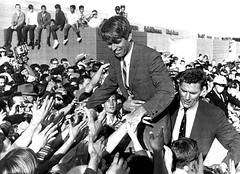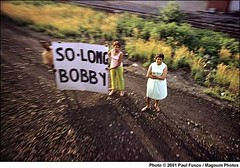June 5, 1968

I'm the wrong age to have personal knowledge of the shock Americans felt 40 years ago today when they awoke to the news that Robert F. Kennedy was shot at the Ambassador Hotel in Los Angeles (which has now been torn down, because LA has such a great sense of history). But as I was driving in to work today I heard the reminiscences and some of the live audio of RFK's final speech before campaign supporters after winning the California primary. There's video of it here, and there's a section in there that both reads as almost a reaction to Rick Perlstein's Nixonland, and also the kind of words we could imagine coming from another young Senator striving to become the President of the United States.
What I think is quite clear is that we can work together in the last analysis, and what has been going on within the United States over the period of last three years, the divisions, the violence, the disenchantment with our society, the divisions, whether it's between blacks and whites, between the poor and the more affluent, or between age groups, or on the war in Vietnam, that we can start to work together. We are a great country, an unselfish country, and a compassionate country, and I intend to make that my basis for running over the period of the next few months... what all of these primaries have indicated, and all of the party caucuses have indicated, whether they occurred in Colorado or Idaho or Iowa... is that the people in the Democratic Party, and people in the United States want a change. And that change can come about only if those who are delegates in Chicago recognize the importance of what has happened here in the state of California, what has happened in South Dakota, what happened in New Hampshire, what happened across the rest of this country. The country wants to move in a different direction. We want to deal with our own problems within our own country, and we want peace in Vietnam.
The message of change is nothing new, and Robert Kennedy is a study in change all by himself. A conservative who worked for Senator Joe McCarthy in the 1950s, who signed the orders to wiretap Martin Luther King while Attorney General, Kennedy eventually had his moment where he saw the true face of America, the struggles in the inner cities, the plight of the farm workers whose cause he championed, and he came around to his better self, running a campaign in 1968 based on peace and equality, and a better life for all citizens.
That story is well-known. What I did not know was the story at the rememberance page put up today by the Los Angeles Times.
David Steiner was a Justice Department employee who left his job to work on the campaign for Robert Kennedy in 1968. He was one of the two men who ran to the microphones and starting asking for the doctors in the audience to come to the hotel kitchen. He literally lost his innocence at that moment and spent decades in the wilderness.
He drove around Los Angeles for days, depressed and lost. He saw the photos and TV footage of "Bobby" lying on his back, blood pouring from his head. Steiner thought Kennedy looked like a little boy, alone, as people panicked around him.
Following the assassinations of JFK and the Rev. Martin Luther King Jr., Steiner saw this as the very vision of hope dying. Old, cynical forces had finally trampled a youthful insurgency that sought only justice and peace.
Steiner hooked up with an old girlfriend and went with her one afternoon to a hairstylist on La Cienega Boulevard. While she was getting her hair done, he wandered the street and stepped into a rug shop. The owner -- a burly, thick-forearmed man -- offered him some tea. They sat and talked about the assassination. The man kept saying how the Kennedys were womanizers. Steiner blurted out: "I think I'm going to Europe."
The man, perhaps sensing that Steiner had lived a sheltered life, offered some advice: "Jump in every barrel of . . . you can find." [...]
He signed up for film school at UCLA and worked the window at All-American Burger on Melrose Avenue and La Cienega Boulevard. One day, he saw a stylish man coming up to the window.
It was his father.
They eyed each other.
"It was the Kennedy thing, wasn't it?" his dad asked.
The look in his eye said more: Why is my Boalt grad, Justice Department attorney son working at burger stand?
"Yeah," Steiner said.
The hope was boiled out of this guy, another casualty of the chaos of the 1960s. For those who were idealistic enough to believe that something different would appear, in our politics and in our culture, only to see those leaders murdered over and over, this is probably a familiar story.
We're moving into a campaign season where another candidate is using the rhetoric of change to inspire a nation. With the weight of decades of disappointment, a media that is congenitally clueless and the last eight years of near-total heartbreak, there are always going to be those cynics who roll their eyes and expect the absolute worst. A lot of the time, I'm one of them. It's like David Steiner at the burger stand. That story, however, ended well. Steiner eventually started teaching high school, and through the experience restored some of his confidence that we can, piece by piece, fulfill the vision of the Kennedy campaign in 1968.
I don't expect my leaders to fully mirror every single one of my views, I know there will be times they'll disappointment and at those moments I'll exercise whatever options I can to hold them accountable. But as Digby said earlier today, things do get better. Things can change. And we all are allowed a moment or two to dream.

Labels: 1968, Barack Obama, memorial, Robert F. Kennedy, The 1960s






<< Home